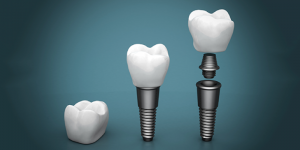 When it comes to tooth replacement options, dentures can be a great cost-effective solution, particularly if you are looking to replace a whole row of teeth at once. However, they do come with a few drawbacks.
When it comes to tooth replacement options, dentures can be a great cost-effective solution, particularly if you are looking to replace a whole row of teeth at once. However, they do come with a few drawbacks.
For example, you may find that your dentures are not quite as comfortable as you anticipated, or you might have difficulty speaking with them. Additionally, the limitations they place on your diet can be difficult to deal with. If that is the case for you, you might want to look into other options, such as dental implants.
Many patients who follow this path on their tooth replacement journey worry that having had dentures already, they may no longer be able to receive dental implants. Fortunately, it is definitely possible for you to receive dental implants after having dentures.
However, there are some factors to consider prior to undergoing the implant procedure that can help you better determine whether this procedure is right for you.







